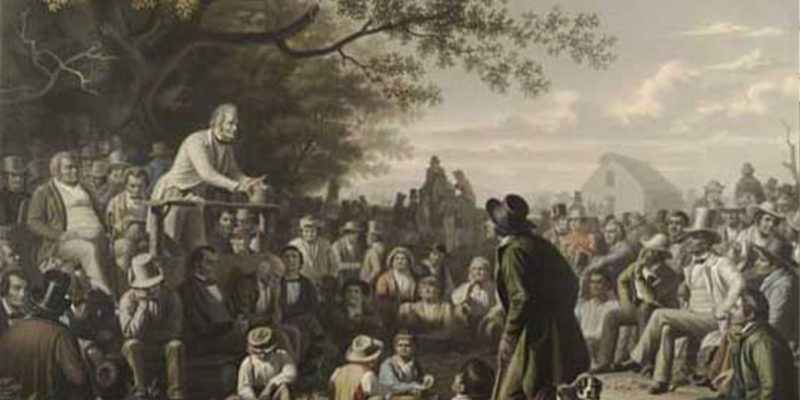How did a poor farmer’s son who spent his youth publicly mocking religious preachers and never joined a church earn the description “Christ in Miniature” by Leo Tolstoy (White, “Divine Providence”)? While President Abraham Lincoln’s religious life evades easy explanation, his love for the Bible and its teachings cannot be denied. He frequently laced his speeches with Biblical ideas and language, capturing the attention of a Biblically-aware audience. Indeed, Frederick Douglass dubbed Lincoln’s last and perhaps most religious speech, his Second Inaugural, as more a sermon than a Presidential address (White 2006a, 7). Lincoln’s use of Biblical references and quotes act not only as a rhetorical device but add deeper dimension to his message by creating a meta-narrative through the Biblical text. His clever interweaving of Biblical references makes room in a relatively short speech for Lincoln to atone for both personal and national sins and question the religious destiny of America. The speech, one of Lincoln’s last, implores a torn nation to acknowledge its wrongdoing and look towards Heaven to pave forward a path through the ruins of catastrophe.
While many scholars endeavor to classify Lincoln’s religious beliefs as falling within a specific system, others contend that Lincoln’s faith defies definition (Holbreich and Petranovich 2014,123-124). His beliefs likely developed over time through life experiences. Some argue his beliefs most developed throughout the Civil War and especially after he lost his son Willie to typhoid in 1862. After Willie’s death, Lincoln developed a close relationship with Pastor Phineas Densmore Gurley at the New York Avenue Presbyterian Church in Washington, D.C., and began to attend his speeches and confide in him. Lincoln himself told members of the Baltimore Presbyterian Synod in 1863 that the journey of his presidency persuaded him to believe more strongly in and rely more on Divine providence. He stated the following:
I have often wished that I was a more devout man than I am. Nevertheless, amid the great difficulties of my administration, when I could not see any other resort, I would place my whole reliance on God, knowing that all would go well, and that He would decide for the right.” (quoted in Luthin 1960, 398)
Although Lincoln states he only relies on God when he has nothing left towards which to turn, he nevertheless expresses some belief in Divine providence. Ronald White writes “Lincoln may not have joined a church, but he was joined at the hip to the Bible” (White 2006b).
The question of Lincoln’s attraction to the Bible removed from organized religion deserves consideration. Randall and Current summarize the future president’s religious attitudes succinctly: Lincoln “breathed the spirit of Christ while disregarding the letter of Christian doctrine” (Randall and Current 2000, 377). Lincoln frequently used the Bible as his moral compass with respect to contemporary issues. He applied its principles to any political issue he could, often citing the Bible’s teachings as support for his positions (Wolf 1963). Thus, for Lincoln, the Bible and politics traveled hand-in-hand: “his ideas moved,” writes Charles Sumner, “as the beasts entered Noah’s ark, in pairs” (Sumner qtd. in Barrett 1865, 813). He developed an interest in the interplay between moral law and human invention, exemplified by his thirty-four Biblical references in a speech about human innovation, his First Lecture on Discoveries and Inventions.
Some view Lincoln’s use of Biblical teachings in his speeches as merely tools of political persuasion to which his audiences could relate (Holbreich and Petranovich 2014, 124). While Lincoln probably intended some references to the Bible for solely rhetorical purposes, he often aimed towards loftier goals. Matthew Holbreich and Danilo Petranovich write that Lincoln often utilized these quotes to obscure deeper (and often unpopular) meanings of his words. Indeed, if one compares Lincoln’s writings to that of his abolitionist contemporary William Seward, one may argue that Lincoln’s success and Seward’s lack thereof resulted from Lincoln’s ability to expertly cloak his abolitionist positions and Seward’s explicit derision of slavery (Holbreich and Petranovich 2014, 140, fn 72). Holbreich and Petranovich further opine that Lincoln used the Bible to place his words and American issues within the context of a grand narrative. Here, too, one can compare Lincoln to Seward. Seward’s speeches simply argue against slavery, while Lincoln’s words express his anti-slavery position as part of a more expansive vision for America and a divinely-inspired world.
The Bible’s distinct role in Lincoln’s speeches may have peaked with Lincoln’s Second Inaugural address. Given March 4, 1865, only six weeks before his assassination, the Second Inaugural may read as the president’s “last will and testament,” a final opportunity to preach to his nation (White 2006b). Lincoln first briefly summarized the events leading up to the war and then spoke to the nation according to the standard structure of a sermon. A sermon usually consists of two main parts, an indicative and an imperative. An indicative invokes an event in Biblical history in which God judged humans but displayed His grace, and an imperative teaches the lesson and practical next step learned from the indicative. The first three paragraphs of Lincoln’s Address can be viewed as its indicative, as Lincoln discusses some events leading up to the Civil War, the reality of slavery, and the stain of the war. God’s judgment can be viewed as the war or the tragic extent of the war that atoned for the sins of slavery. The final paragraph of the speech consists of Lincoln’s imperative, as he implores the nation to action, to “strive,” “to bind up,” “to care” “to do all” to receive God’s grace.
The four Biblical quotations in Lincoln’s Second Inaugural derive from three sources: the Adam and Eve narrative in Genesis, the Gospel of Matthew, and Psalms. The Genesis reference reads as follows: “it may seem strange that any men should dare to ask a just God’s assistance in wringing their bread from the sweat of other men’s faces.” It echoes the Old Testament’s “by the sweat of your brow you will eat bread” (Genesis 3:19). After the sin of Eden, in the verse Lincoln paraphrases, God declares Man’s destiny to be working the ground, obtaining sustenance through his own labor. To benefit from someone else’s labor reverses the divine ordination. Lincoln explicitly recognized the slaveowner’s reversal of Genesis in a letter to journalist Albert Hodges a year before his Second Inauguration, berating the hypocrisy of those who use scripture to defend an act explicitly opposing God’s directive to Adam. Lincoln classifies reaping from someone else’s work as stealing, forcefully taking not only the actual product but by stealing the slave’s self-worth. Lincoln was known in general to harbor distinct appreciation for laborers and praise them as foundational to society (Wolf 1963, 178).
Lincoln’s next biblical reference is from Matthew 18:7: “woe unto the world because of offenses; for it must needs be that offenses come, but woe to that man by whom the offense cometh.” The quote laments the almost insurmountable temptation of sin and recognizes the suffering of the person who falls for the temptation. Using the quote in the context of slavery and the Civil War implies Lincoln viewed the sin of slavery as unavoidable, something that “needs be.” At the same time, woe to the slaveowner for not overcoming such a need. New Testament commentator Matthew Henry notes that the verse intends to dissuade one from holding a grudge against those who offend by removing some of the blame from the offender. The offender certainly acted wrongly and deserves rebuke, but, since all humans are sinners, he should never be severed from his community. Lincoln’s reference presents the sin of slavery as a temptation to ease the tension between North and South. The South certainly sinned, but all Americans are guilty of permitting slavery in the original Constitution. Thus, Lincoln seeks to decrease Southern guilt and dampen Northern triumphalism to unify a divided nation.
The other two Biblical references concern judgment, both the judgment of humans and the judgment of God. Lincoln states “let us judge not, that we be not judged,” paralleling Matthew 7:1’s “do not judge, or you, too, will be judged.” Lincoln’s line emerges directly after his Genesis reference, as if to say the South sinned but should not be judged for doing so. By telling his countrymen not to judge for even the most impactful of sins, Lincoln stresses the importance of forgiveness. The North’s confidence in a successful victory was so great by the second inauguration that their sense of triumph over the South needed to be tempered. The North cannot judge, lest they be judged and their own sins revealed.
Lincoln compares the human judgment of Matthew 7 to the Divine judgment of Psalms 19:10 when he says “the judgments of the Lord are true and righteous altogether.” Human judgment carries bias, while God’s decision to afflict both the North and the South with the Civil War bears a categorical correctness. Stewart Lance Winger adds that the Second Inaugural acts as Lincoln’s personal repentance for claiming to understand God’s actions and assuming divine support for the North at Gettysburg (Winger 2003, 207). Even as the war neared its end at the time of the Second Inaugural, Lincoln worried over the North’s prospects for success and began to question which side, if either, God desired to win. Winger’s understanding adds another layer to Lincoln’s Genesis reference, as Eve’s sin involved her wrongly assuming God’s intentions in his prohibition to eat from the Tree of Knowledge. Winger mentions more personal moments in Lincoln’s life for which the president may have been atoning in his Second Inaugural, including his legal defense earlier in his life of a slaveowner’s right to keep a slave and his prior reluctance to free all slaves with the Emancipation Proclamation (Winger 2003, 207).
Thinking more deeply about Lincoln’s references adds another layer to the president’s preaching. Adam’s punishment for the original sin extends beyond having to work the ground—he and Eve also suffer banishment from Eden. For Lincoln to invoke Adam’s sin, he alludes to the grave possibility of exile, or the loss of life in paradise. Americans at the time of the country’s inception trusted the New World to birth a new Adam who would maintain the purity and righteous innocence Europe had lost. Although Lincoln warned against the division of the Union, he never mentioned a threat of exile until the Second Inaugural. At Gettysburg, Lincoln declared “we cannot hallow this ground. The brave men, living and dead, who struggled here, have consecrated it.” His speech exudes positivity, confidently portending a “new birth of freedom” for the United States government that “shall not perish from the earth.” After the blood of war filled the streets of America for two more years, Lincoln uprooted his statements at Gettysburg by referencing not God’s sanctification of the ground but His cursing of it in Genesis. The horrors of the Civil War by its end portray a Divine judgment of America as not innocent but perhaps as stained as the Old World.
With his Second Inaugural Address, Lincoln expressed regret over personal actions and suggested taking a second look at the United States’ religious destiny. Winger (2003) writes that the speech proposed that “America was no longer the culmination of the world history: merely one nation among many that . . . remained no closer to the Kingdom of God than any other” (208). The Second Inaugural declared that the New Adam had fallen and brought the security of the New Eden into question for the first time. Thus, as Jeremiah of the Old Testament beseeched his corrupt nation to repent and do what is right by God (Jeremiah 22:3), Lincoln advised his people to do nothing but what is “in the right, as God gives [them] to see the right.” As Jeremiah berated Israel for abusing the widow and the orphan (Jeremiah 7:6, 22:3), Lincoln tells every American citizen to “to care for . . . his widow, and his orphan.” Lacking the confidence of Gettysburg that promised a sound future for his country, the presidential prophet, ends his Second Inaugural with a conditional, that only by performing “charity for all” will the United States “achieve and cherish a just, and a lasting peace, among ourselves, and with all nations.”
Holbreich and Petranovich (2014) suggest Lincoln foresaw that a successful post-slavery rebirth of the United States, like the nation’s original birth through the Revolution, would require violence and the shedding of blood (146). However, understanding Lincoln’s deliberate Biblical references and their contexts suggests the president did not anticipate the horrors that the Civil War would bring and began to consider that America may never be reborn after all. If both the North and the South did not put their trust in God and repent for their multiple sins, God may have expelled them from the New World as He did Adam and Eve from Eden. As a result, Lincoln’s Second Inaugural Address acts not as a statement of confidence in the country he intended to lead for another four years but a plea to his nation to atone for its errors and save its beloved country by ending the Civil War with unity and putting its faith in Divine grace.
Works Cited
Barrett, Joseph Hartwell. 1865. Life of Abraham Lincoln: Presenting His Early History, Political Career, and Speeches In and Out of Congress. New York, NY: Moore, Wilstach, and Baldwin.
Henry, Matthew. “Matthew 18.” Bible Study Tools, Salem Web Network, www.biblestudytools.com/commentaries/matthew-henry-complete/matthew/18.html.
Holbreich, Matthew, and Danilo Petranovich. 2014. “In the Valley of the Dry Bones: Lincoln’s Biblical Oratory and the Coming of the Civil War.” History of Political Thought 35 (1) pp. 121–146.
Lincoln, Abraham. “Second Inaugural Address.” Bartleby, www.bartleby.com/124/pres32.html.
–. “Gettysburg Address.” Abraham Lincoln Online, www.abrahamlincolnonline.org/lincoln/speeches/gettysburg.htm.
–. “Letter to Thurlow Weed.” Teaching American History, Ashbrook Center at Ashland University, teachingamericanhistory.org/library/document/letter-to-thurlow-weed/.
–. “Speech at Lewistown, Illinois.” Collected Works of Abraham Lincoln, University of Michigan.
Luthin, Reinhard Henry. 1960. The Real Abraham Lincoln: a Complete One Volume History of His Life and Times. New Jersey: Prentice-Hall.
Randall, J. G., and Richard Nelson Current. 2000. Lincoln the President: Last Full Measure. Champaign, IL: University of Illinois Press.
“The Death and Funeral of Willie Lincoln.” Abraham Lincoln Online, www.abrahamlincolnonline.org/lincoln/education/williedeath.htm.
White, Ronald C. 2006a. Lincoln’s Greatest Speech: the Second Inaugural. New York, NY: Simon & Schuster Paperbacks.
White, Ronald C. 2006b. “Lincoln and Divine Providence.” Response: The Seattle Pacific University Magazine 29 (3).
Winger, Stewart Lance. 2003. Lincoln, Religion, and Romantic Cultural Politics. DeKalb, IL: Northern Illinois University Press.
Wolf, William J. 1963. The Religion of Abraham Lincoln. New York, NY: Seabury Press.




 Compass is an online journal that provides a space for the work of talented undergraduates who have original and well-articulated insights on important ideas and issues relating to American democracy understood in the broad contexts of political philosophy, history, literature, economics, and culture.
Compass is an online journal that provides a space for the work of talented undergraduates who have original and well-articulated insights on important ideas and issues relating to American democracy understood in the broad contexts of political philosophy, history, literature, economics, and culture.